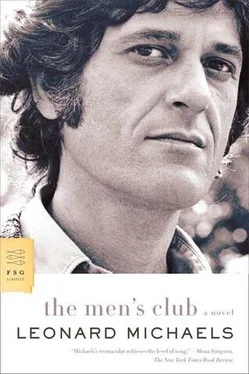“Excuse me,” I said, intimating regret but moving quickly away.
My friend Cavanaugh — big, handsome guy — had heroic charisma. He’d been a professional basketball player. Now he worked at the university in special undergraduate programs, matters of policy and funding. Nine to five, jacket and tie. To remember his former work — the great naked shoulders and legs flying through the air — was saddening. In restaurants and airports people still asked for his autograph.
Things felt better, more natural, healthier, with the big man in the room. Kramer reached him before I did. They slapped each other’s arms, laughing, pleased at how they felt to each other. Solid. Real. I watched, thinking I’d often watched Cavanaugh. Ever since college, in fact, when he’d become famous. To see him burn his opponent and score was like a miracle of justice. In civilian clothes, he was faintly disorienting. Especially his wristwatch, a golden, complicated band. Symbolic manacle. Cavanaugh’s submission to ordinary life. He didn’t burn anybody. He’d once said, “I don’t want my kids to grow up like me, necks thicker than their heads.” He wanted his kids in jackets and wristwatches.
He stopped slapping Kramer’s arms, but Kramer continued touching him and looked as though he might soon pee in his pants. People love athletes. Where else these days do they see such mythic drama? Images of unimpeachable excellence. I was infected by Kramer’s enthusiasm, a bit giddy now at the sight of Cavanaugh. When Kramer left to get him a beer, we shook hands. He said, “I didn’t think I’d see you tonight.” There was mockery in his smile.
“It’s not so easy getting out of the house. Nobody but you could have dragged me to this.”
“You open the door, you’re out.”
“Tell me about it.”
“I’m glad you’re here. Anything happen yet? I’m a little late because Sarah thinks the club idea is wrong. I’m wrong to be here. We argued at dinner.” He whispered, “Maybe it isn’t easy,” and looked at his wristwatch, frowning, as if it were his mind. Kramer returned with the beer just as a phone started ringing.
“I’ll be right back,” said Kramer, turning to the ringing.
Sarah’s word “wrong” seemed wrong to me. If something was wrong with Cavanaugh, it was wrong with the universe. Men could understand that. When Cavanaugh needed a loan to buy his house, the bank gave him no trouble. You could see his credit was good; he was six foot nine and could run a hundred yards in ten seconds. The loan officer, a man, recognized Cavanaugh and didn’t even ask about his recent divorce or alimony payments.
Men’s clubs. Women’s groups. They suggest incurable disorders. I remembered Socrates — how the boys, not his wife, adored him. And Karl Marx running around with Engels while Jenny stayed home with the kids. Maybe men played more than women. A men’s club, compared to women’s groups, was play. Frivolous; virtually insulting. It excluded women. But I was thinking in circles. A men’s club didn’t exclude women. It also didn’t exclude kangaroos. It included only men. I imagined explaining this to Sarah. “You see, men love to play.” It didn’t feel convincing. She had strong opinions and a bad temper. When Cavanaugh quit basketball, it was his decision, but I blamed her anyway. She wanted him home. The king became the dean.
Kramer shouted from another room, “Is anybody here named Terry? His wife is on the phone. She’s crying.” Shouting again, more loudly, as if to make sure the woman on the phone would hear him, Kramer said, “Is anybody in this house named Terry?”
Nobody admitted to being named Terry.
Shouting again, Kramer said, “Terry isn’t here. If Terry shows up, I’ll tell him to phone you right away. No, I won’t forget.”
When Kramer returned he said, “You guys sure none of you is named Terry?”
Cavanaugh muttered, “We’re all named Terry. Let’s get this club started.”
We made a circle, some of us sitting on the rug on pillows. Kramer began talking in a slow, rational voice. The black eyes darkened his face. His words became darker, heavier, because of them.
“What is the purpose of this club?”
To make women cry, I thought. Kramer’s beginning was not very brilliant, but he looked so deep that I resisted judgment.
“Some of us — Solly Berliner, Paul, Cavanaugh — had a discussion a few weeks ago. We agreed it would be a good idea …”
Paul was the short, marijuana man; he had an eager face and voice. Kramer nodded to him when he said his name. He went on about the good idea. I wasn’t listening.
I thought again about the women. Anger, identity, politics, rights, wrongs. I envied them. It seemed attractive to be deprived in our society. Deprivation gives you something to fight for, it makes you morally superior, it makes you serious. What was left for men these days? They already had everything. Did they need clubs? The mere sight of two men together suggests a club. Consider Damon and Pythias, Huck and Jim, Hamlet and Horatio. The list is familiar. Even the Lone Ranger wasn’t lonely. He had Tonto. There is Gertrude Stein and Alice B. Toklas, but, generally, two women suggest gossip and a kiss goodbye. Kramer, still talking, meandered in a sea of nonexistent purpose. I said, “Why are you talking about our purpose? Let’s just say what we want to do.”
I stopped him midmeander, then felt sorry, wishing I’d kept quiet, but he looked relieved — a little surprised, not offended. “Can you make a suggestion?”
I glanced at Cavanaugh. I was his guest and didn’t want to embarrass him. I’d been too aggressive maybe; too impatient. He said, “Go on.”
“I suggest each of us tell the story of his life.”
The instant I said that I laughed, as if I’d intended a joke. What else could it be? I didn’t tell the story of my life to strangers. Maybe I’d lived too long in California, or I’d given too many lectures at the university; or else I’d been influenced by Berliner, becoming a confessional person. Nobody else laughed. Cavanaugh looked at me with approval. Berliner grinned with rigid ferocity. He loved the suggestion. Kramer said, “I’ll go first.”
“You want to? You like the idea?”
“One of us can talk at each meeting. I have listened to numerous life stories in this room.” Kramer, apparently, was a psychotherapist, but the room seemed an odd place for his business — all the plants, colors, artwork. It burst on every side with cries for attention, excitations, a maniacal fear of boredom.
“It will be good for me,” he said, “to tell the story of my life, especially like this, in a nonprofessional context. It will be a challenge. I’m going to put it on tape. I will tape each of us.”
I imagined him sitting among his plants and pottery listening to life stories, tape recorder going, dark face and tattoos presiding over all.
“Let’s talk to one another, Kramer. No machines.”
To my dismay Kramer yelled, “Why the hell not? I have so much talk on my tapes — friends, clients, lovers — that I don’t even know what I have. So much I don’t even remember.”
I’d struck something sensitive, but I heard myself yelling back at him, a man who looked angry, even dangerous, “If you didn’t put it on tape, you’d remember.”
Everyone laughed, including Kramer. He said, “That’s good, that’s good.” No anger at all. I was strangely pleased by this violence. I liked Kramer for laughing.
“That’s very good. I’m going to write that down,” he said.
“Yeah,” said Cavanaugh, “no tape recorder. But I want an idea of what this life-story business is like.”
“You know what it’s like,” said Berliner. “It’s like in the old movies when people were always talking to each other. Ingrid Bergman tells Humphrey Bogart about herself. Who she is. Where she’s been. Then they screw.”
Читать дальше












